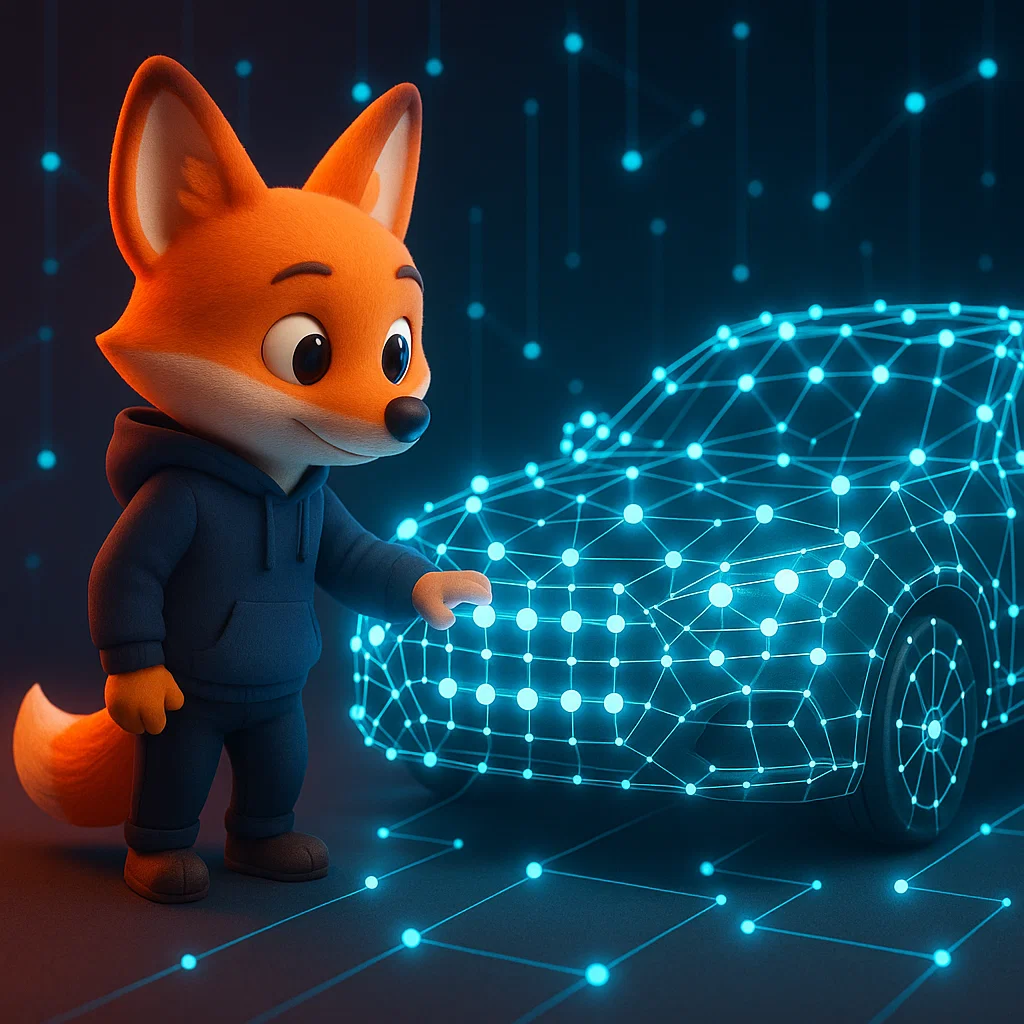Transforming Mobility, Transparency, and Trust
The integration of blockchain in the automotive industry is creating a paradigm shift in how vehicles are designed, sold, insured, and operated. The future of Blockchain in the Automotive Industry is unfolding faster than ever, driven by demand for transparency and automation. With its unique ability to provide immutable, transparent, and decentralized records, blockchain is solving long-standing issues in automotive such as fraud, supply chain opacity, and inefficiencies in logistics and payments. As the industry evolves into a digital-first landscape, blockchain is positioned to become a foundational technology across the entire automotive lifecycle.
Immutable Vehicle Identity and Ownership History
One of the most promising use cases of blockchain in the automotive industry is the creation of a secure and tamper-proof digital identity for each vehicle. This digital passport includes key data such as:
- Verified mileage logs
- Maintenance and repair history
- Ownership transfers
- Accident records
By storing this information on a decentralized ledger, buyers and sellers can verify a car’s history without relying on centralized databases or third-party certifications. BMW’s “VerifyCar” initiative allows users to scan a vehicle’s QR code and instantly access its immutable data. This increases trust in the secondary market, reduces odometer fraud, and helps maintain higher resale values. These advantages clearly demonstrate how Blockchain in the Automotive Industry improves the integrity of vehicle ownership records.
Ensuring Authenticity Through Supply Chain Transparency
Fighting Counterfeit Auto Parts
Counterfeit parts are a critical problem for the automotive sector, causing safety risks and costing companies billions annually. Blockchain offers a robust solution by enabling traceability from the origin of raw materials to the installation of components.
A major area where Blockchain in the Automotive Industry is gaining momentum is in securing and verifying supply chains for vehicle components. With blockchain and RFID integration, automakers like Mercedes-Benz and Volvo track the lifecycle of each part, validating its authenticity and origin. For example, BMW has tested chemical markers combined with blockchain to trace raw materials like cobalt used in EV batteries. This not only ensures quality but supports ethical sourcing and compliance with international regulations.

Smart Contracts for Sales, Leasing, and Vehicle Financing
Smart contracts are programmable agreements stored on the blockchain that execute automatically when conditions are met. Their use in the automotive sector is growing, especially for:
- Vehicle purchase agreements
- Leasing contracts
- Insurance activation
- Warranty validation
DocuSign’s early collaboration with Visa introduced this concept back in 2015, and since then, several OEMs have begun developing blockchain-based contract systems. These contracts reduce paperwork, prevent tampering, and accelerate transactions while ensuring compliance and accountability. Start trading crypto with Bybit—low fees, fast execution, and zero hassle for beginners. As such, Blockchain in the Automotive Industry is set to replace outdated paper-based agreements with smart, enforceable logic.

Usage-Based Insurance and Real-Time Claims Processing
Enabling Fair Pricing and Automated Settlements
The insurance sector is leveraging blockchain in the automotive industry to create usage-based insurance (UBI) models. Through IoT devices and vehicle sensors, data such as:
- Driving behavior
- Speed patterns
- Mileage
- Braking and cornering habits
can be recorded on-chain and accessed securely by insurers. Blockchain ensures that this data cannot be altered or falsified. Toyota has partnered with BigchainDB and MIT to explore blockchain-backed auto insurance systems. These allow for real-time claim validations, fraud reduction, and automatic premium adjustments based on actual driving behavior.
Improving Automotive Logistics and International Shipping
Global vehicle logistics is a multi-layered process involving manufacturers, transporters, customs agents, and dealerships. It is highly paper-intensive and prone to delays and fraud.
Blockchain improves supply chain visibility by offering:
- Digital bills of lading
- Secure customs documentation
- Real-time tracking of shipments
- Verified handoffs between stakeholders
The TradeLens platform by IBM and Maersk has demonstrated the power of blockchain in logistics, and similar models are being adopted by automotive giants to streamline vehicle delivery and reduce administrative bottlenecks.
V2X Communication and Autonomous Vehicle Ecosystems
As vehicles become more connected and autonomous, Vehicle-to-Everything (V2X) communication is critical. Blockchain provides the infrastructure to enable:
- Vehicle-to-vehicle alerts
- Smart traffic signal interaction
- Secure data exchange between cars and infrastructure
Storing sensor data and vehicle event logs on blockchain allows for tamper-proof auditing and enhances the safety of autonomous systems. In case of an accident or system failure, this data can help resolve disputes, inform future improvements, and retrain AI models more accurately. These data-driven decisions are only possible through the secure and decentralized nature of Blockchain in the Automotive Industry.
Enabling Autonomous Payments: Tolls, Charging, and Fueling
Vehicles equipped with blockchain-powered digital wallets can autonomously pay for:
- Highway tolls
- Parking spots
- Electric vehicle (EV) charging
- Fuel refills
BMW’s “Charge‑Chain” pilot uses smart contracts to allow EVs to plug into a charging station, verify credentials, receive energy, and complete payment—all without human interaction or third-party apps. Jaguar Land Rover has also been testing similar technologies to support real-time micropayments and reduce reliance on central payment processors.
Ledger is the gold standard for hardware crypto wallets. Store your coins offline, safely.
Ethical Sourcing and Environmental Transparency
As environmental and human rights concerns rise, consumers demand proof of ethical sourcing—especially in the production of electric vehicles.
Blockchain allows automakers to trace:
- Origins of cobalt, nickel, lithium
- Labor practices at mining sites
- Carbon emissions along the supply chain
Another ethical breakthrough powered by Blockchain in the Automotive Industry is the transparent sourcing of battery minerals and components. Volvo, in collaboration with Circulor, has implemented blockchain solutions to guarantee that materials used in EV batteries are mined responsibly. This increases consumer trust and aligns automakers with ESG and sustainability goals.
Classic Car Restoration and Heritage Documentation
In the high-value world of classic and heritage cars, authenticity is everything. Blockchain is being used to record and preserve:
- Restoration processes
- Technician and workshop data
- Provenance of parts used
Projects built on Hyperledger Fabric have already begun documenting this data to prevent disputes and ensure proper valuation during sales. Immutable documentation enhances the investment value and historical credibility of vintage cars.
Secure Firmware Updates and Software Integrity
Autonomous and semi-autonomous vehicles rely on constant software updates for navigation, safety, and performance.
Blockchain ensures:
- Authenticity of over-the-air (OTA) updates
- Prevention of malicious firmware uploads
- Secure logging of update history
Frameworks like Block4Forensic use blockchain to verify that only validated software is deployed across vehicle fleets, reducing cybersecurity threats and enhancing trust in autonomous systems.
Advantages of Blockchain in the Automotive Industry
The use of blockchain in the automotive industry provides numerous benefits, including:
- Transparency: Immutable records of vehicle data, parts, and ownership
- Efficiency: Automation reduces paperwork, time, and costs
- Security: Tamper-proof logs and verified software deployment
- Sustainability: End-to-end traceability of materials and emissions
- Innovation: New business models like data monetization, tokenized loyalty, and decentralized car-sharing
These advantages are pushing more OEMs, logistics companies, insurers, and regulators to explore blockchain integration as a strategic imperative.
Challenges to Widespread Blockchain Adoption
Despite the clear benefits, the automotive sector faces several barriers to adopting blockchain at scale:
- Interoperability Issues: Different blockchain networks may struggle to communicate effectively
- Scalability Concerns: High transaction volumes require robust infrastructure
- Legal Ambiguity: Enforceability of smart contracts varies across jurisdictions
- Integration Complexity: IoT and RFID systems must securely interface with blockchain
- Stakeholder Resistance: Adoption requires coordinated efforts across the supply chain
Overcoming these challenges will depend on standardization, public-private collaboration, and technological advancement.
Future Outlook: A Decentralized Mobility Ecosystem
One of the most promising recent developments is the California DMV’s blockchain pilot, which digitized over 42 million vehicle titles using the Avalanche protocol. This initiative eliminates lien fraud, speeds up ownership transfers, and provides a transparent alternative to legacy systems.
As more government agencies and private players embrace blockchain, we are moving toward a fully decentralized mobility ecosystem, often referred to as Mobility 4.0. This vision includes:
- Interconnected data systems between OEMs, insurers, and authorities
- Vehicles making autonomous payments and decisions
- Secure, real-time data exchange across infrastructure nodes
- Seamless user experience from vehicle purchase to retirement
This marks a turning point in how Blockchain in the Automotive Industry is becoming the foundation for next-generation mobility ecosystems.
Want more crypto knowledge? Join our newsletter for weekly insights, free guides, and tools
Blockchain will serve as the digital backbone enabling this transformation, unlocking trust, efficiency, and innovation at every level of the automotive supply chain.
Conclusion: The Road Ahead for Blockchain in the Automotive Industry
As we’ve seen throughout this guide, Blockchain in the Automotive Industry is not just a futuristic concept it’s an active force transforming how vehicles are built, sold, powered, and trusted. From securing supply chains to enabling autonomous payments and enhancing insurance models, blockchain offers real, tangible solutions to decades-old industry problems.
While challenges like scalability, regulatory clarity, and stakeholder alignment still remain, the momentum is undeniable. Manufacturers, regulators, and consumers alike are beginning to recognize the long-term value of decentralization and trustless systems.
Looking ahead, the integration of blockchain will likely become a standard rather than a differentiator. Companies that embrace this evolution early will be better positioned to lead the next wave of mobility innovation one that is transparent, ethical, efficient, and secure.
Also look for others blockchain innovation like blockchain interoperability solutions.
The road is open, the infrastructure is forming, and the revolution is underway. The only question is: how fast will the rest of the industry catch up?
How does blockchain prevent odometer fraud?
Blockchain records mileage data directly from the vehicle’s internal systems onto an immutable ledger. Since each entry is time-stamped and cannot be altered retroactively, it becomes virtually impossible to manipulate or reset the odometer without being detected.
Can blockchain speed up vehicle ownership transfers?
Yes, blockchain can significantly accelerate the process. Projects like the California DMV’s pilot on the Avalanche blockchain allow vehicle titles to be digitized and transferred instantly through digital wallets eliminating the need for in-person DMV appointments or paperwork delays.
What are smart contracts for car leasing?
Smart contracts are digital agreements that automatically execute lease conditions. For example, when a payment is made, the contract can automatically activate insurance or unlock vehicle access removing the need for manual approvals or third-party mediation.
How is blockchain used in EV charging?
Electric vehicles can use blockchain-based smart contracts to pay for charging sessions. As soon as the vehicle connects to a station, the system identifies it, tracks the energy used, and processes the payment automatically no apps, cards, or user actions required.
Is blockchain scalable enough for automotive data?
Yes, but with some limitations. Permissioned blockchains like Hyperledger Fabric and protocols designed for IoT environments, such as IOTA, can handle high transaction volumes needed in the automotive space. However, broader scalability still depends on further technological improvements and standardization across the industry.
“Guess what? When you click and buy via our links, you’re not just enhancing your experience—you‘re also supporting our content creation for free, so we can keep sharing useful blockchain insights. It‘s a pump for both of us!”
— Black






